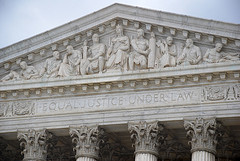Supreme Court To Decide Whether Companies Can Use Forced Arbitration To Skirt Federal Laws

(afagen)
The case at hand, American Express v. Italian Colors Restaurant, centers on the question of whether or not an arbitration clause in the credit card company’s merchant contract prohibits that merchant from pursuing claims outside of arbitration, even in cases where the merchant is alleging violations of federal law.
The plaintiffs in this case are alleging that Amex violates the Sherman Act by forcing those merchants who accept American Express charge cards to also accept Amex credit and debit cards, for which the merchants say they pay higher rates than they do on competing credit cards and debit cards.
Originally, a U.S. District Court granted Amex’s request to compel arbitration in this case, as required by the credit card company’s merchant agreement. The plaintiff appealed, and in 2009, the Second Circuit Court of Appeals reversed the lower court’s ruling, holding that the class action waiver was unenforceable.
The merchant had argued that not only did forced arbitration take away the plaintiff’s ability to pursue its rights under the law, arbitration also placed an undue financial burden on the merchant, as the cost for the research and expert testimony involved in an antitrust case were far out of its price range. In this case, the plaintiffs claimed that a single market study required to help prove its case against Amex would cost at least $1 million, while arbitration would limit Amex’s liability to only a few thousand dollars.
The appeals court agreed, writing that the class action waiver would “effectively preclude any action seeking to vindicate the statutory rights asserted by the plaintiffs.”
Even after SCOTUS issued the Concepcion ruling, bolstering companies’ ability to enforce arbitration agreements, the Second Circuit maintained its position on the Amex case, saying that the AT&T case did not address whether a class action waiver could be enforced if “the practical effect of the enforcement would be to preclude [plaintiffs’] ability to vindicate their federal statutory rights.”
Amex argues that arbitration clauses should be enforced as written and as agreed to by the merchants. The credit card company claims that studies show forced arbitration actually lowers costs for consumers. Finally, Amex asserts that — just as arbitration might put undue financial burden on plaintiffs — class-action suits put the same burden on companies that fight claims with no merit.
In an amicus brief filed on behalf of the plaintiffs, lawyers for Public Citizen argue against Amex’s position:
In the face of respondents’ demonstration that the arbitration agreement does not permit effective vindication of their rights, American Express invokes what it perceives as the benefits that arbitration may offer claimants in other types of cases — in particular, employment and consumer cases. But whatever the merits of American Express’s controversial assertions that arbitration benefits litigants generally, those assertions do nothing to answer the evidence showing that requiring arbitration on the facts of this case would amount to enforcing an invalid waiver of substantive rights. Declining to enforce an arbitration agreement in the narrow circumstances where plaintiffs demonstrate that it would deprive them of their substantive claims will not detract from any benefits that arbitration may offer in other cases.
“The reality is that corporations hide forced arbitration clauses in the fine print of their contracts, hand-pick their own biased arbiter, and then leave consumers and small businesses with high fees and no opportunity for public review or real accountability,” says Ellen Taverna, Legislative Director of the National Association of Consumer Advocates. “In this case, American Express is hiding behind a forced arbitration clause to attempt to grant itself immunity for violating antitrust laws and cheating small businesses.”
If SCOTUS sides with American Express in this case, it is effectively saying that companies can not only use forced-arbitration clauses to prevent class-action lawsuits, but that these same companies can avoid allegations of federal antitrust violations by compelling customers into arbitration procedures that are not fit to handle such matters.
Want more consumer news? Visit our parent organization, Consumer Reports, for the latest on scams, recalls, and other consumer issues.

